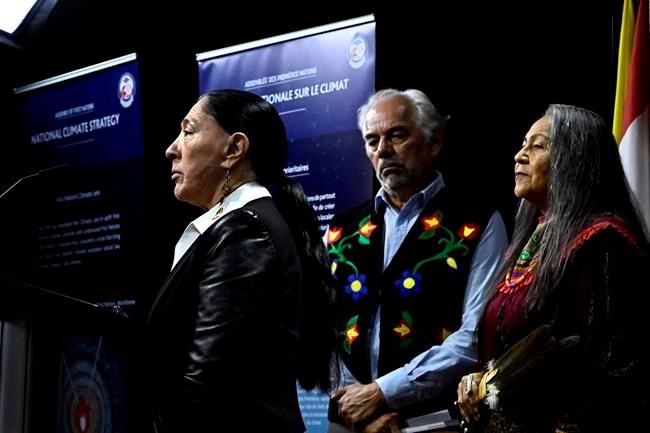OTTAWA — The Assembly of First Nations launched its new national climate strategy in Ottawa on Wednesday, calling on federal, provincial and territorial governments to work with First Nations to implement their climate priorities.
Interim National Chief Joanna Bernard said this year's record-breaking wildfire season is a reason why all leaders should be taking climate change seriously, especially in First Nations communities.
More than 150,000 square kilometres of land were burned, affecting both First Nations and non-First Nations communities alike.
"This is only the beginning," said Bernard, adding more extreme weather can be expected — "including fires, floods, tornadoes, hurricanes, species migration (and) coastal sea level rise, among other challenges."
In the face of this, Indigenous Peoples have taken matters into their own hands to try to find solutions, Bernard said.
The assembly's member First Nations declared a climate emergency in July 2019, in recognition of how climate change was negatively affecting their lands, waters, animals and peoples.
The declaration called for the development of a First Nations-led climate strategy, which the AFN unveiled on Parliament Hill on Wednesday.
The strategy aims to incorporate Indigenous knowledge systems, rights and self-determination in co-operation with other governments, and seeks "urgent and transformative climate action" that includes First Nations solutions.
But the road to introducing mitigation measures, rather than just reacting to climate disasters as they happen, could be a difficult one.
A report from the federal auditor general last year found the federal government still hasn’t provided First Nations with the support they need to respond to emergencies such as wildfires and floods, despite similar warnings almost a decade ago.
The report concluded that the government was too reactive, and was failing to proactively spend on infrastructure that could mitigate damage when floods, fires and landslides strike.
The auditor pointed out that as of April 2022, 112 such projects did not have funding despite meeting the criteria for eligibility, and 74 of them had been in the department's backlog for more than five years.
"Until these projects are completed, First Nations communities are likely to continue to experience emergencies that could be averted by investing in the right infrastructure," the report read.
Based on the First Nations Infrastructure Fund's annual budget of $12 million, it would take the department an estimated 24 years to fund the projects, the report added.
"As a result, First Nations communities are likely to continue to experience emergencies that could be prevented or mitigated by building the infrastructure."
At the time, Indigenous Services Canada said it was reviewing its emergency management plans and working with First Nations to identify infrastructure gaps and "work toward closing that gap in the long term."
A spokesperson for Indigenous Services Minister Patty Hajdu said the government's national adaptation strategy aims to better support Indigenous climate leadership, knowledge and solutions.
Zeus Eden added in a written statement that the department is seeking to address each recommendation in the auditor's report, and it is funding a slate of fire prevention activities, including training emergency management co-ordinators in First Nations across the country.
"We will continue to work with First Nations partners to improve emergency management services. This includes supporting new First Nations-led service delivery models that reflect community needs and First Nations' inherent right to self-determination," said Eden's statement.
Still, the 60-page climate strategy report from the AFN references funding gaps, saying First Nations continue to face what they call chronic underfunding from all levels of government, including around education, health care and infrastructure.
It calls for stable, ongoing investments for the financial, technical and human capacity needs of First Nations to secure "a future for all our future generations."
The report seeks a step away from "technological solutions" and "market-based mechanisms" to address the climate crisis, and an acknowledgement that First Nations are inseparable from the land, water and air.
"This dialogue must avoid lapsing into failed narratives about balancing economy and environment, or quick-fix technological solutions, and instead engage ethically and equitably with First Nations knowledge systems," it reads.
The report also includes more than 100 strategies or actions that rely on action to be taken by federal, provincial and territorial governments.
AFN Quebec-Labrador Regional Chief Ghislain Picard called it "an enabling document to create space for First Nations at the local and regional levels."
Despite some First Nations being involved in the oil and gas industry, there are few references to the industry in the report, save for a call to provide stable, adequate and long-term funding to First Nations to address the effects of abandoned oil and gas wells.
Asked how the AFN would work with Nations involved with resource development, Picard said creating a space for discussions about resource development is the first step. He noted that many leaders have to make difficult choices about employment in their communities.
"How do we ensure the future while dealing with the social acceptability of some initiatives that affect our lands? I think it's a challenging discussion, but it needs to happen," said Picard.
"We also have some duty and obligation to set the right conditions for everybody to be heard."
But he said the real challenge is for governments to respect the principles outlined in the United Nations Declaration on the Rights of Indigenous Peoples — especially the right to self-determination and the requirement to obtain free, prior and informed consent from Nations before making decisions that affect them.
"As the saying goes, nothing about us without us," said Bernard.
"The government has a tendency to prepare things and submit it to us and then say, 'What do you think?' I think it's a waste of time and money."
Bernard said she wants to see First Nations included in the drafting of climate solutions from the start, rather than such discussions happening behind closed doors without the AFN's input.
This report by The Canadian Press was first published Oct. 18, 2023.
— With files from Stephanie Taylor.
Alessia Passafiume, The Canadian Press



